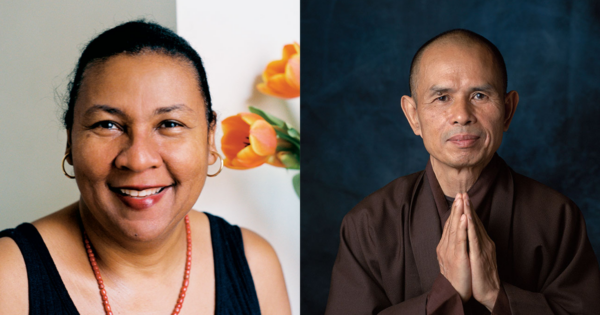How to Set Better Boundaries
Guided by Buddhist teachings on the brahmaviharas, Elizabeth Hernandez-Stomp helps us learn when to say yes and how to say no. The post How to Set Better Boundaries appeared first on Lion's Roar.

Guided by Buddhist teachings on the brahmaviharas, Elizabeth Hernandez-Stomp helps us learn when to say yes and how to say no.

Photo © Mattia / Stocksy United
Years ago, I fell in love with a person I thought was my soul mate. We felt deeply for one another, yet we didn’t know how to make our relationship work. We would break up and make up, again and again. Sometimes he’d meet another woman, date her, and after some time end their relationship. Then he’d come back to me, hoping to pick up where we’d left off. Guess what I did? I waited for his return, over and over, until one day, he never came back.
This breakup was bound to happen sooner or later. You see, I didn’t know myself enough—my inherent value. I didn’t know how to set clear emotional boundaries.
Many years have passed. Now, I’m wholeheartedly thankful for this experience because the hurt broke me open and led me to the path I am on. I studied spiritual psychology, found the dharma, and took refuge. During my healing process, I came across Buddhist teachings on the four brahmaviharas, the four divine abodes: metta (loving-kindness), karuna (compassion), mudita (sympathetic joy), and upekkha (equanimity). Practicing with these four states of mind helped me learn to navigate relationships, and I was able to see the light after years of pain. The brahmaviharas have become my dwelling place, where I feel at peace and whole.
Now, as a mindfulness teacher and life coach, I meet countless people who are in unbalanced relationships with colleagues, family, friends, and romantic partners. Lack of boundaries manifests in myriad ways. Many of us have developed a belief that we must be overly nice, pleasing, or helpful to escape feelings of unworthiness. This false belief can lead to resentment, anger, and shame.
Boundaries enable us to feel safe and empowered in our relationships. In every situation, boundary-setting is an act of compassion that takes courage, consistency, and knowing what you want. Prioritize setting firm, compassionate boundaries and communicating authentically with others. It’s essential for your well-being and happiness.
To help you set better boundaries, here are some suggestions based on the four brahmaviharas.
Metta: Loving-kindness
Metta meditation can help you befriend and value yourself, and thereby assist you in setting boundaries.
To practice metta meditation, sit or lie down comfortably and invite a sense of relaxation. Take two or three deep breaths with complete, slow exhalations. Let go of any concerns or thoughts of the past or the future. Bring a quality of stability into your body and perhaps imagine the breath moving through it, filling your lungs and your heart area.
Get in touch with a feeling of loving-kindness toward yourself and offer the following phrases: “May I be happy. May I be healthy. May I be safe. May I be peaceful and at ease.” While you say these phrases, allow yourself to receive the good intentions they express.
After some time directing loving-kindness toward yourself, bring to mind a friend or someone in your life who has deeply cared for you. Then slowly repeat the loving-kindness phrases: “May you be happy. May you be healthy. May you be safe. May you be peaceful and at ease.” Again, try to feel the heartfelt intentions of wishing for someone’s well-being. If feelings of loving-kindness arise, stay with them.
As you continue with the meditation, bring to mind other loved ones, such as a friend or pet; a neutral person, such as a neighbor; a spiritual figure who’s particularly meaningful to you; and finally, people with whom you have some difficulty. For each person, repeat the phrases “May you be happy. May you be healthy. May you be safe. May you be peaceful and at ease.”
It’s important to know that sometimes while practicing metta meditation, difficult feelings may arise, including shame, grief, and anger. If you experience this, know that it’s completely normal. As best as you can, notice what you’re feeling and stay with it—with patience, gentle acceptance, and kindness. If it’s a stretch to stay with the feeling, you can choose to direct the loving-kindness to a different person, or to direct it toward the difficult feeling, or to take a break. You always have the choice.
Practicing metta meditation can help you reconnect with yourself and others and rebuild your self-esteem, one loving phrase at a time. Practicing loving-kindness toward yourself will help you identify and clarify your needs. When expressing your boundaries, clarity is essential; be specific about your needs when talking to others (and to yourself). It’s okay to say no. Prioritize self-care and work on personal healing. Ask yourself, “Where do I need to place boundaries? Why?”
Karuna: Compassion
As the heart begins to open, compassion allows us to hold our pain (emotional, physical, mental, and spiritual) in a field of acceptance. We become aware of our own distress and that of others, increasing our capacity for empathy.
Tune in to your emotions. Meet them with kindness, grace, and acceptance. Even when a difficult emotion arises, meet it with compassion as best as possible. Observe it without pushing it away or grasping onto it. Ask yourself: “Why am I feeling this way?”
Practicing with compassion, you learn to hold your pain kindly and gently. This enables you to see our entire experience from a different angle, and you gain insight. You come to understand the causes that drive you to abandon and betray yourself.
Personal boundaries are loving guidelines that can help you not get lost in a sea of other people’s needs, feelings, opinions, and expectations. In setting boundaries, you’re not only being compassionate toward yourself, you’re being generous enough with the other person to be truly honest with them. This honesty is also an act of compassion.
Mudita: Sympathetic Joy
Mudita, which is the practice of finding joy and delight in the happiness of others, is like a flower in full bloom, radiating beauty, grace, and contentment. As we start appreciating ourselves, caring for our emotions, expressing our needs, and realizing that we have the agency to care for our needs, we naturally experience more joy, gratitude, and happiness, including mudita. Ask yourself: “How do I want to feel when relating to myself and others?”
Upekkha: Equanimity
Equanimity is a state of psychological stability and composure. Equanimity enables us to “be” with whatever arises rather than fighting against it. We’re okay with life, however it unfolds.
Equanimity can assist in your efforts to remain consistent when establishing boundaries for yourself and others. As you learn to establish boundaries, sometimes things won’t go as you hope. You may struggle with the thought of disappointing others, or you may struggle to find the words to communicate your needs. This is all a natural part of the process.
Setting better boundaries will take time and effort, but your consistency will pay off. Confidence and self-respect will follow.

 KickT
KickT 
































